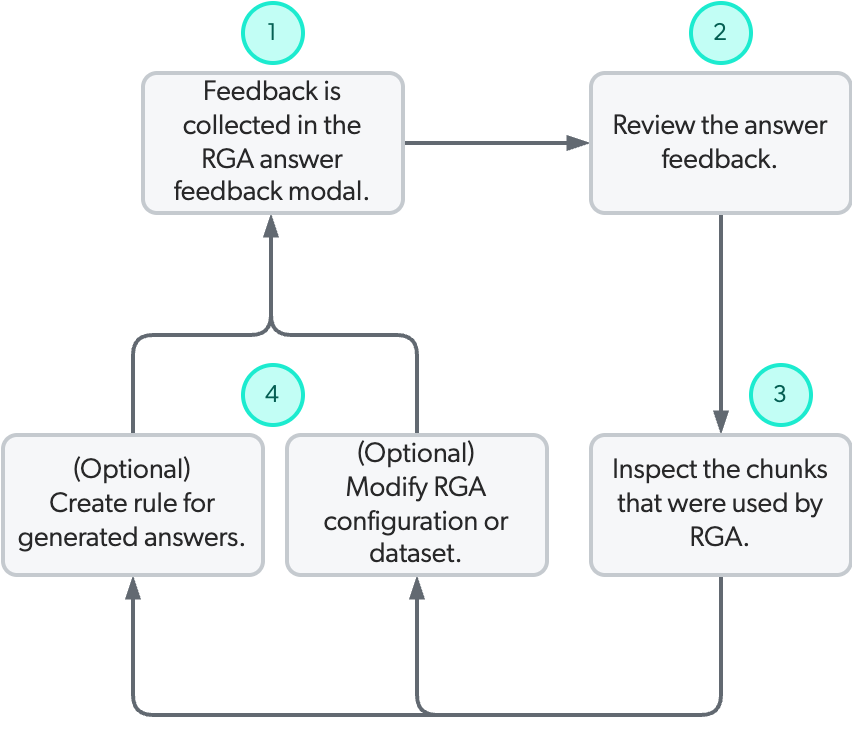Knowledge Hub
Knowledge Hub
|
|
The Coveo Knowledge Hub is currently available as a beta to early-access customers only. Contact your Customer Success Manager for early access to this feature. |
The Coveo Knowledge Hub is a centralized knowledge management platform that provides insights into how your content is used in your Coveo implementations, such as when using generative answering, across your various knowledge distribution channels.
The Knowledge Hub tools help organizations develop informed knowledge management strategies. Tools that allow knowledge managers to assess and optimize their content flows and to drive measurable value from Coveo implementations.
Access the Knowledge Hub
Users with the required privileges can access the Knowledge Hub from the Coveo Administration Console.
In the Coveo Administration Console header, use the application picker to select Knowledge Hub.

What you can do in the Knowledge Hub
The initial focus of the Knowledge Hub is to help organizations create impactful generative answering experiences using RGA.
The Knowledge Hub offers a suite of tools that knowledge managers or subject matter experts in an organization can use to help optimize their content for RGA, analyze the performance of their RGA implementations, and manage RGA-generated answers.
| Tool | Features | Documentation |
|---|---|---|
Answer Manager |
View feedback for your RGA-generated answers. |
|
Create rules to manage your generated answers. |
||
Chunk Inspector |
Analyze the segments of text (chunks) that were used to generate a specific answer using RGA. |
|
See how an item in your index is segmented into chunks by the RGA model. |
When to use the Knowledge Hub features
As a whole, the Knowledge Hub features are designed to help you optimize your RGA implementation. Each of the Knowledge Hub features helps you achieve that objective.
While knowing what a feature does is useful, knowing when to use a feature lets you more easily integrate the feature’s functionality into your organization’s workflow. To understand how to use the Knowledge Hub features effectively, let’s position them within the recommended workflow for how to improve your RGA implementation based on answer evaluation.
Improve your RGA implementation based on answer evaluation
The recommended workflow for improving your RGA implementation is a cyclical process that involves evaluating the generated answers, analyzing the chunks that were used to generate the answers, and then making adjustments to your RGA implementation before returning to evaluating the generated answers.
The following diagram illustrates the cyclical optimization process and describes how the Knowledge Hub features are used in that process:

1 |
When RGA generates an answer for a user query in a search interface, the user can click the thumbs-up or thumbs-down icon in the RGA component to provide feedback on the generated answer. |
2 |
Use the Knowledge Hub Answer Manager to review the answer feedback. You’ll be able to see the query, the generated answer, and the feedback information that was provided. |
3 |
Use the Knowledge Hub Chunk Inspector to inspect the segments of text (chunks) that RGA used to generate the answer. Inspecting the chunks used by RGA provides insight as to why certain segments of text were used over others. This is especially useful when evaluating answers with negative feedback or answers that have been flagged as needing improvement. |
4 |
Based on the information gathered from reviewing the answer feedback and inspecting the chunks used by RGA, you can manage generated answers and improve your RGA implementation by creating rules in the Knowledge Hub Answer Manager, modifying the content used by RGA, and modifying your RGA implementation configuration. |
Required privileges
The following table indicates the privileges required to access the Coveo Knowledge Hub (see Manage privileges and Privilege reference).
| Action | Service - Domain | Required access level |
|---|---|---|
Access the Coveo Knowledge Hub |
Knowledge - Knowledge hub |
Allowed |
Organization - Organization |
View |